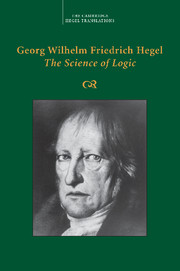Chapter 1 - Specific Quantity
Published online by Cambridge University Press: 30 September 2021
Summary
Qualitative quantity is,
first, an immediate, specific quantum; and this quantum,
second, in relating itself to another, becomes a quantitative specifying, a sublating of the indifferent quantum. This measure is to this extent a rule and contains the two moments of measure as different; namely, the quantitative determinateness and the external quantum as existing in themselves. In this difference, however, the two sides become qualities, and the rule becomes a relation of the two; measure presents itself thereby,
third, as a relation of qualities that have one single measure at first – a measure, however, which further specifies itself in itself into a difference of measures.
THE SPECIFIC QUANTUM
1.Measure is the simple self-reference of quantum, its own determinateness in itself; quantum is thus qualitative. At first, as an immediate measure it is an immediate quantum and hence some specific quantum; equally immediate is the quality that belongs to it; it is some specific quality or other. – Thus quantum, as this no longer indifferent limit but as selfreferring externality, is itself quality and, although distinguished from it, it does not extend past it, just as quality does not extend past quantum. Quantum is thus the determinateness that has returned into simple selfequality – which is at one with determinate existence just as determinate existence is at one with it.
If a proposition is to be made of the determination just obtained, it could be expressed thus: “Whatever is, has a measure.” Every existence has amagnitude, and this magnitude belongs to the very nature of a something; it constitutes its determinate nature and its in-itself. The something is not indifferent to this magnitude, as if, were the latter to alter, it would remain the same; rather the alteration of themagnitude alters its quality.Asmeasure the quantum has ceased to be a limit which is none; it is from now on the determination of a thing, so that, were the latter to exceed or fall short of this quantum, it would perish. –
A measure, in the usual sense of a standard, is a quantum which is arbitrarily assumed as the unit determinate in itself as against an external amount.
- Type
- Chapter
- Information
- Georg Wilhelm Friedrich Hegel: The Science of Logic , pp. 288 - 301Publisher: Cambridge University PressPrint publication year: 2010

